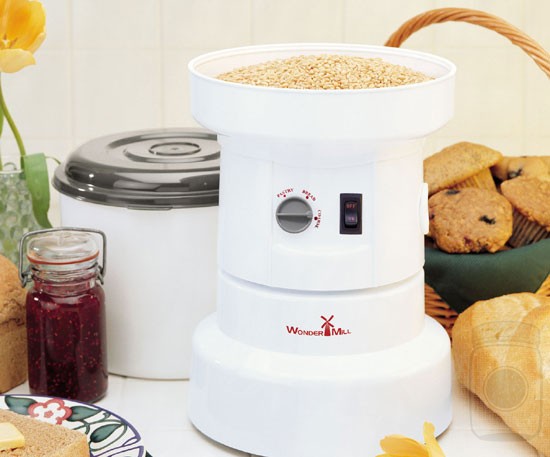Table of Contents[Hide][Show]
 Many readers have emailed me over recent weeks with questions regarding the grain grinding routine in my kitchen. I realized that I needed to take a step back and show you the basics of selecting a grain grinder and other tasks related to making fresh flour to help you determine a routine that works best for you.
Many readers have emailed me over recent weeks with questions regarding the grain grinding routine in my kitchen. I realized that I needed to take a step back and show you the basics of selecting a grain grinder and other tasks related to making fresh flour to help you determine a routine that works best for you.
Remember that starting to grind fresh grain in your home should only be started after you have started cooking with the right fats! Getting the fats right is the most important change you can make in your kitchen.
Using fresh flour is a wonderful addition to your cooking repertoire as even the organic flours from the healthfood store or the ones shipped to your door are nutritionless and not worth the money. Once you grind flour, the nutrition is gone in about 3 days in an unrefrigerated situation. Freezing your flour right after grinding will preserve this nutrition for weeks, which is why you really need to do it yourself. As you can see from the video, flour can be used immediately right out of the freezer, so there is no disadvantage to freezing it.
Grain Requires Proper Preparation after Grinding
Delving into Traditional Eating for the first time inevitably uncovers the fact that modern methods for preparing grains and legumes can be extremely damaging to health over the long term particularly if numerous servings of these foods are consumed on a daily basis as recommended by conventional dieticians and nutritionists.
Even if you take the time and care to make your own bread at home with freshly ground grain, if you do not follow the centuries old traditions for eliminating anti-nutrients and maximizing the nutrition in the grain prior to baking, you could in fact be doing yourself and your family more harm than good. These methods are sour leavening, soaking, and/or sprouting.
But first, you must grind the grain! Below is the video how-to.
Grain Grinding Basics
Sarah, The Healthy Home Economist








Hi Sarah, I love your post and especially enjoy all of the information you share with us novices. After researching your blog I became inspired and decided to purchase the Champion and maximize its use for the benefit of my family's health. I also purchased the wheat from Bread Beckers (soft red) and am now looking forward to a new way of home baking.
I used to be an avid baker in my "spare time" and enjoyed making cakes, pies, pastries, cookies, etc., for family and co-workers, with unbleached all purpose King Arthur Flour and I always had great results. However, since my bold move to purchasing my wheat and grinding my own flour, I've noticed a huge difference in the density of my baked goods. The taste is a bit too heavy and the texture is a lot different than what I envisioned -am I doing something wrong? Should I be soaking the flour (I just watched several of your videos) in the same manner you soak it before making pancakes? I'd like to make some muffins, quick breads and cookies, now that the holidays a vastly approaching, and I don't want to use my freshly ground flour if they don't come out a bit lighter and airy -it will be a costly mistake and I'd like to avoid this.
Can you provide some advise ? How do you prepare your home baked goodies (cookies, cup cakes, etc.) with the freshly ground flour? Thanks in advance and keep up the great work you're doing!
Sincerely,
a fan from NJ
I really don't know if an osterizer would work. Give it a try and see.
I've heard of Vitamix but don't really know what it is. Is it just a really good quality food processor or blender? I have an Osterizer that I used to grind whole oats and rice for the twins' baby food. It did a great job. Could I use it to grind wheat as well? I don't have anything else, except a Cuisinart food processor and very small coffee grinder, and we're watching our expenses right now.
Yes, I know a number of folks who use the Vitamix and love it.
Can I use my Vitamix for Grinding grains?
Hi Amanda, the grain attachment for the Champion does get warm but not hot. Certainly, it is not nearly hot enough to damage the proteins in the grains. The grains would get much much hotter baking in an oven and baking does not damage the grains either. I have never considered the heat generated by a grinder to be much of an issue for these reasons.
just wondering about the grain mill attachment for the Champion and heating the flour. I have read heating while grinding will damage the proteins and that the vitamix, for example, gets too hot. i assume the champion is fairly cool? any ideas on which other grinders would keep the flour cool enough? thanks!
Hi Janet, I use both. I prefer freshly ground flour soaked in yogurt, kefir, or clabbered milk for pancakes, waffles and the like over sprouted flour as the texture is much softer.
I thought you only used sprouted flour. So what is best to use, sprouted flour or soaked flour, or does it matter or is there different uses for each?
Yes – I do prepare the flour before baking – please see my soaking flour video. The video next week will also explore this topic further.